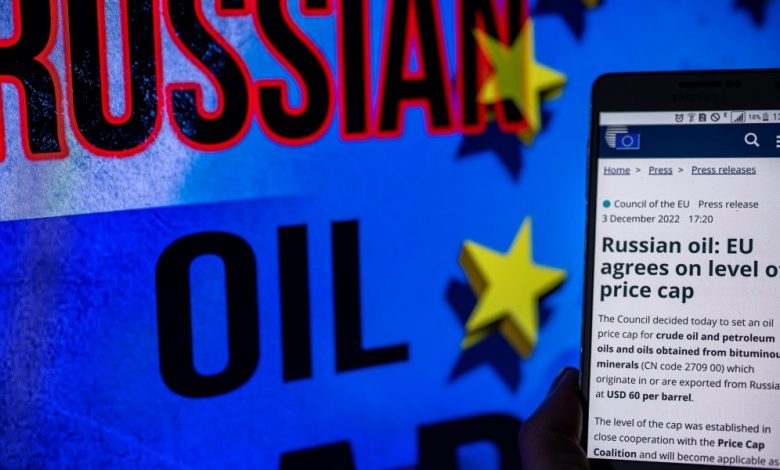EU and G7 boycott of Russian crude fuels oil prices spike

US futures fell and oil prices rose on Monday after the European Union and the Group of Seven Democracies agreed to boycott most of Russian oil and pledged to cap Russian exports at $60 a barrel.
Futures for the Dow Jones Industrials and the S&P 500 were each down about 0.4% before the bell.
It’s unclear how much Russian oil the two sanctions could remove from the world market, tightening supply and driving up prices. The world’s second-largest oil producer has been able to divert many, but not all, of its past European shipments to customers in India, China and Turkey.
On Sunday, the OPEC+ alliance of oil producers, including Russia, maintained their goals for transporting oil into the global economy. In October, the alliance opted to cut production by 2 million barrels a day from November, increasing tensions with the US and Western allies.
U.S. benchmark crude rose $2.17 to $82.15 a barrel in electronic trading on the New York Mercantile Exchange. It lost $1.24 to $79.98 a barrel on Friday.
Brent crude edged up $2.27 to $87.84 a barrel after Western countries on Monday began imposing the $60 a barrel price cap and ban on some Russian oils.
However, prices have been falling since March, when a barrel of both US and Brent crude rose above $130 a barrel.
In Asian trading, Hong Kong’s benchmark rose 4.5% to 19,518.29. The Shanghai Composite rose 1.8% to 3,211.81.
There is hope that disruptions to manufacturing and trade are easing as Chinese authorities lift some of the most severe restrictions imposed to contain outbreaks of the coronavirus, while saying their “zero-COVID” strategy — those aimed at aims to isolate any infected person – space still in force. The curbs included the closure of neighborhoods or buildings, frequent mandatory testing, and the closure of factories and other businesses.
There have been several days of protests in cities including Shanghai and Beijing as public frustration over the COVID-19 curbs sparked riots. Some called for the resignation of Chinese President Xi Jinping in an extraordinary display of public dissent in a society over which the ruling Communist Party exercises near-total control.
Tokyo’s Nikkei 225 rose 0.2% to 27,820.40 and Seoul’s Kospi slipped 0.6% to 2,419.32. In Sydney, the S&P/ASX 200 was up 0.3% to 7,325.60. Stocks fell in Mumbai but rose in Singapore and Taiwan. Thailand’s markets were closed for a public holiday.
Germany’s DAX and CAC 40 in Paris each lost 0.6%, while Britain’s FTSE 100 climbed 0.2% higher.
Stocks were mixed on Friday after new data showed US wages were accelerating despite aggressive tactics by the Fed to cool them and the economy in its bid to contain inflation. This data increased the likelihood that the Fed will hold interest rates, which could plunge the country into a recession.
The S&P 500 fell 0.1% and the Dow Industrial rose 0.1%. The Nasdaq Composite fell 0.2%.
Stocks have rallied over the past month on hopes that inflation may have peaked, allowing the Federal Reserve to pare rate hikes aimed at undercutting inflation by slowing the economy and raising stock prices and pull down other assets.
But Friday’s jobs report showed wages for workers last month rose 5.1% from a year earlier. That’s an acceleration from October’s 4.9% gain and slightly better than economists’ expectations for a slowdown.
US employers added 263,000 jobs last month. That beat economists’ forecasts of 200,000 while the unemployment rate remained steady at 3.7%. Many Americans also continue to stay out of the labor market entirely, with a larger percentage of people either not working or looking for work than before the pandemic, which could increase pressure on employers to raise wages.
Still, a growing number of economists are predicting that the US economy will slide into recession next year, largely on the back of higher interest rates.
In currency trading, the dollar rose to 135.27 Japanese yen from 134.39 yen late Friday. The euro rose to $1.0563 from $1.0540.
Our new weekly Impact Report newsletter will examine how ESG news and trends are shaping the roles and responsibilities of today’s leaders – and how best to address these challenges. Subscribe here.



